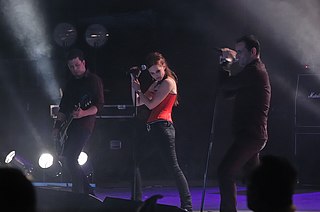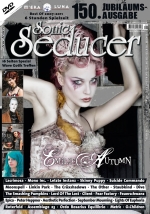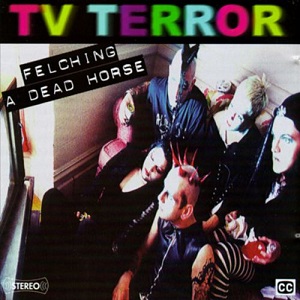
Goth is a music-based subculture that began in the United Kingdom during the early 1980s. It was developed by fans of gothic rock, an offshoot of the post-punk music genre. Post-punk artists who presaged the gothic rock genre and helped develop and shape the subculture include Siouxsie and the Banshees, Bauhaus, the Cure, and Joy Division.

Bauhaus were an English rock band formed in Northampton in 1978. Known for their dark image and gloomy sound, Bauhaus are one of the pioneers of gothic rock, although they mixed many genres, including dub, glam rock, psychedelia, and funk. The group consisted of Daniel Ash, Peter Murphy, Kevin Haskins (drums) and David J (bass).
Gothic rock is a style of rock music that emerged from post-punk in the United Kingdom in the late 1970s. The first post-punk bands which shifted toward dark music with gothic overtones include Siouxsie and the Banshees, Joy Division, Bauhaus, and the Cure.
Death rock is a rock music subgenre incorporating horror elements and gothic theatrics. It emerged from punk rock on the West Coast of the United States in the early 1980s and overlaps with the gothic rock and horror punk genres. Notable death rock acts include Christian Death, Kommunity FK, 45 Grave, and Super Heroines.

Gothic fashion is a dressing style marked by dark, mysterious, antiquated, homogenous, and often genderless features worn by members of the Goth subculture. The typical gothic fashion style includes dyed black exotic hairstyles, dark lipstick and dark clothing. Both male and female goths can wear dark eyeliner, dark nail polish and lipstick for a dramatic effect. Male goths use cosmetics at a higher rate than other men. Styles are often borrowed from the punk fashion and can also draw influence from Victorians and Elizabethan fashion. Goth fashion is sometimes confused with heavy metal fashion and emo fashion.

Theatre of Tragedy was a Norwegian band from Stavanger, active between 1993 and 2010. They are best known for their earlier albums, which influenced the gothic metal genre.

Type O Negative were an American gothic metal band formed in Brooklyn, New York City in 1989 by Peter Steele, Kenny Hickey, Josh Silver, and Sal Abruscato, who was later replaced by Johnny Kelly. Their lyrical emphasis on themes of romance, depression, and death resulted in the nickname "the Drab Four". The band went platinum with 1993's Bloody Kisses, and gold with 1996's October Rust, and gained a fanbase through seven studio albums, two best-of compilations, and concert DVDs.
A rivethead or rivet head is a person associated with the industrial dance music scene. In stark contrast to the original industrial culture, whose performers and heterogeneous audience were sometimes referred to as "industrialists", the rivethead scene is a coherent youth culture closely linked to a discernible fashion style. The scene emerged in the late 1980s on the basis of electro-industrial, EBM, and industrial rock music. The associated dress style draws on military fashion and punk aesthetics with hints of fetish wear, mainly inspired by the scene's musical protagonists.
Gothic metal is a fusion genre combining the aggression of heavy metal with the dark atmospheres of gothic rock. The music of gothic metal is diverse with bands known to adopt the gothic approach to different styles of heavy metal music. The genre originated during the early 1990s in the United Kingdom originally as an outgrowth of death-doom, a fusion of death metal and doom metal. Lyrics are generally dark and introspective with inspiration from gothic fiction as well as personal experiences.
Ethereal wave, also called ethereal darkwave, ethereal goth or simply ethereal, is a subgenre of dark wave music that is variously described as "gothic", "romantic", and "otherworldly". Developed in the early 1980s in the UK as an outgrowth of gothic rock, ethereal wave was mainly represented by 4AD bands such as Cocteau Twins, This Mortal Coil, and early guitar-driven Dead Can Dance.
The Toronto goth scene, the cultural locus of the goth subculture in Toronto, Ontario, Canada and the associated music and fashion scene, has distinct origins from goth scenes of other goth subcultural centres, such as the UK or Germany. Originally known as the "Batcavers", the term "goth" appeared only after 1988, when it was applied to the pre-existent subculture. Distinctive features included internationally recognized gothic and vampiric fashion store 'Siren', a goth-industrial bar named 'Sanctuary: The Vampire Sex Bar', and Forever Knight, a television series about an 800-year-old vampire living in Toronto. In Toronto, the goths did not seek to reject mainstream status, and achieved partial acceptance throughout the mid to late 1990s.

Aurelio Voltaire Hernández, professionally known as Aurelio Voltaire or simply Voltaire, is a Cuban-American musician, singer, composer, author, and animator. Known for his gothic style of dress and music, Voltaire is considered a leading figure in the dark cabaret music genre. He has released 13 studio albums, including Riding a Black Unicorn Down the Side of an Erupting Volcano While Drinking from a Chalice Filled with the Laughter of Small Children (2011), BiTrektual (2012), and Raised by Bats (2014). He has also created songs for the Cartoon Network animated series The Grim Adventures of Billy & Mandy (2001–2007).
The Singapore Dark Alternative Movement (S.D.A.M.) is an informal, social collective catering to the needs of the Singaporean gothic and alternative lifestyle community. It also functions as a support/help group for members within the latter regarding issues such as suicide, gender and sexuality. Although cited by their official webpage as having the date of their creation as 1998, the name of the collective only surfaced in 2005 with the return of former leader Saito Nagasaki from Perth, Australia.

Sonic Seducer is a German music magazine that covers gothic rock, new wave, EBM and other kinds of electronic music and culture. The magazine is noted for organizing the annual M'era Luna Festival. Since its inception in 1994, the Sonic Seducer has become one of the major publications of the dark culture in Germany.
Rhombus are a British gothic rock band based in West Yorkshire, England.
Zillo was a German alternative music magazine, published monthly, originally edited by Rainer "Easy" Ettler. It was in circulation between 1989 and 2014. The headquarters of Zillo were in Lübeck.
Die Laughing are an English goth band formed in 1986 by John Berry.
Orkus is a monthly German music and culture magazine published by the Zoomia Media Group. Despite its subtitle and its web tagline, it includes all popular music genres including metal, medieval rock, Neue Deutsche Härte, alternative rock, electro and futurepop. The gothic rock, dark wave and industrial music genres have had only a minor presence since the late 1990s.
Bella Lune is a darkwave/dreampop band that was formed in 2007 in Phoenix, Arizona, USA. The band incorporates elements of darkwave, post-punk, synthpop, shoegaze, and ethereal music to create a dreamlike trance throughout their sound. Bella Lune cites many 80s post-punk and new wave bands as influences, including The Cure, Joy Division, Depeche Mode, Cocteau Twins, New Order, Siouxsie and the Banshees, Bauhaus, and Love and Rockets.

TV Terror: Felching a Dead Horse is a various artists compilation album released on September 23, 1997, by Re-Constriction Records. The idea came to fruition when Permission founder Jayson Elliot discovered Monochrome - A Tribute to the Sisters of Mercy via a car ride through Chicago in June 1994 and compiled the music on the second disc. Its release was the cause of the first utterance of the word "felch" on national television when Kurt Loder reported its release on MTV News.








